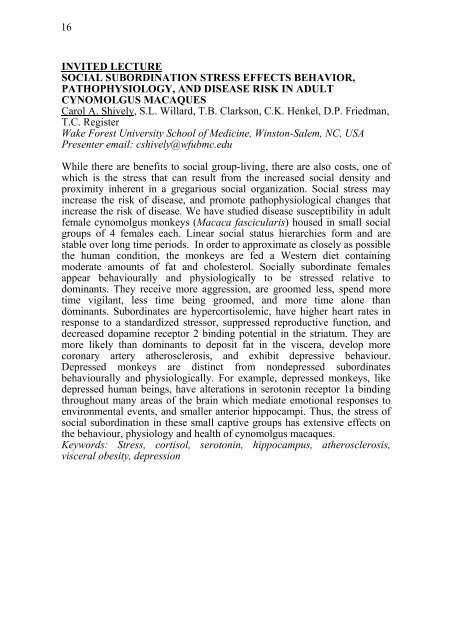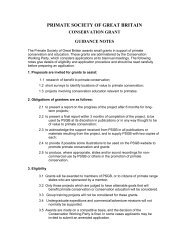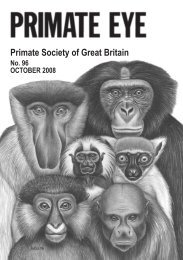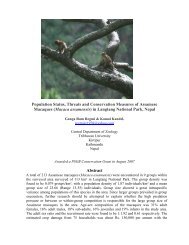2009 Vol 99.pdf (2.45mb) - Primate Society of Great Britain
2009 Vol 99.pdf (2.45mb) - Primate Society of Great Britain
2009 Vol 99.pdf (2.45mb) - Primate Society of Great Britain
You also want an ePaper? Increase the reach of your titles
YUMPU automatically turns print PDFs into web optimized ePapers that Google loves.
16<br />
INVITED LECTURE<br />
SOCIAL SUBORDINATION STRESS EFFECTS BEHAVIOR,<br />
PATHOPHYSIOLOGY, AND DISEASE RISK IN ADULT<br />
CYNOMOLGUS MACAQUES<br />
Carol A. Shively, S.L. Willard, T.B. Clarkson, C.K. Henkel, D.P. Friedman,<br />
T.C. Register<br />
Wake Forest University School <strong>of</strong> Medicine, Winston-Salem, NC, USA<br />
Presenter email: cshively@wfubmc.edu<br />
While there are benefits to social group-living, there are also costs, one <strong>of</strong><br />
which is the stress that can result from the increased social density and<br />
proximity inherent in a gregarious social organization. Social stress may<br />
increase the risk <strong>of</strong> disease, and promote pathophysiological changes that<br />
increase the risk <strong>of</strong> disease. We have studied disease susceptibility in adult<br />
female cynomolgus monkeys (Macaca fascicularis) housed in small social<br />
groups <strong>of</strong> 4 females each. Linear social status hierarchies form and are<br />
stable over long time periods. In order to approximate as closely as possible<br />
the human condition, the monkeys are fed a Western diet containing<br />
moderate amounts <strong>of</strong> fat and cholesterol. Socially subordinate females<br />
appear behaviourally and physiologically to be stressed relative to<br />
dominants. They receive more aggression, are groomed less, spend more<br />
time vigilant, less time being groomed, and more time alone than<br />
dominants. Subordinates are hypercortisolemic, have higher heart rates in<br />
response to a standardized stressor, suppressed reproductive function, and<br />
decreased dopamine receptor 2 binding potential in the striatum. They are<br />
more likely than dominants to deposit fat in the viscera, develop more<br />
coronary artery atherosclerosis, and exhibit depressive behaviour.<br />
Depressed monkeys are distinct from nondepressed subordinates<br />
behaviourally and physiologically. For example, depressed monkeys, like<br />
depressed human beings, have alterations in serotonin receptor 1a binding<br />
throughout many areas <strong>of</strong> the brain which mediate emotional responses to<br />
environmental events, and smaller anterior hippocampi. Thus, the stress <strong>of</strong><br />
social subordination in these small captive groups has extensive effects on<br />
the behaviour, physiology and health <strong>of</strong> cynomolgus macaques.<br />
Keywords: Stress, cortisol, serotonin, hippocampus, atherosclerosis,<br />
visceral obesity, depression






